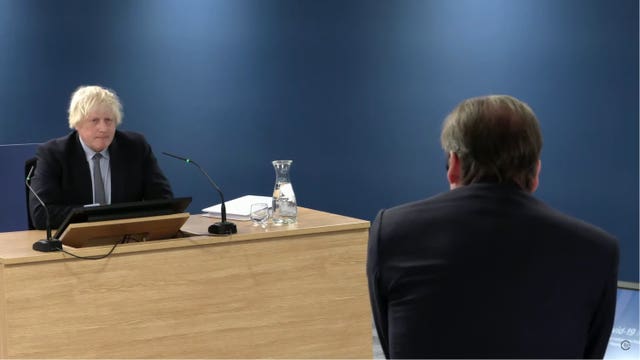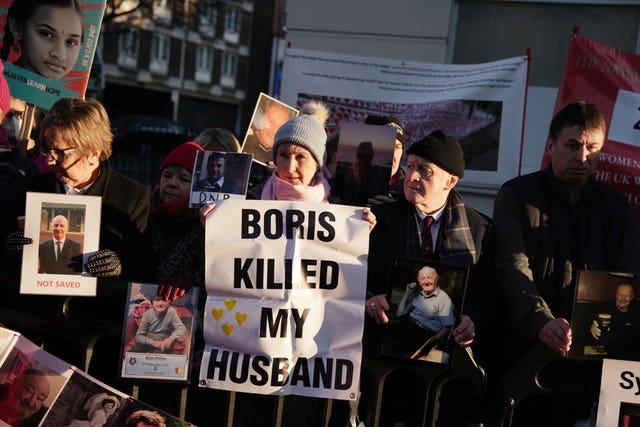Boris Johnson has admitted he should have “twigged much sooner” about the threat posed by Covid-19 in the early days of the pandemic, as he apologised for “the pain and the loss and the suffering” of its victims.
The first day of the former prime minister’s highly anticipated evidence to the UK Covid-19 Inquiry, which was hit by protests, also saw him defending the culture of his No 10 after other witnesses branded it “toxic”.
He rejected accusations he had shown poor leadership by oscillating over whether to back tough restrictions in the early months of 2020.
Former aides have blamed Mr Johnson’s tendency to veer on key decisions in March of that year for delaying the lockdown.
But he argued it was his job to “test” the “completely novel policy”, adding: “It matters to the livelihoods of people up and down the land. I had to go through the arguments and that is what I was doing.”
Challenged over the slow response to the unfolding crisis, Mr Johnson said Whitehall “underestimated” the need for action, adding that it was only when he saw the “horrors” of the outbreak in Italy that he realised the seriousness of the virus.
He suggested the experience of previous diseases such as Sars, Mers and swine flu clouded officials’ judgment while a coronavirus pandemic was “outside our living experience”.
Mr Johnson said: “When you read that an Asiatic pandemic is about to sweep the world, you think you’ve heard it before. And that was the problem.
“But I think it’d be fair to say that the scientific community within Whitehall at that stage was not telling us that – I was not being informed that – this was something that was going to require urgent and immediate action.”

The ex-premier said his government “might have operated differently” if it had believed some of the early forecasts that were being made about Covid-19, but was unable “to comprehend the implications”.
“I think collectively in Whitehall there was not a sufficient loud enough klaxon of alarm.”
The former Tory leader defended his eventual decision to order England’s first lockdown on March 23 2020, saying by the middle of that month he was giving arguments against restrictions “pretty short shrift”.
“I no longer had the luxury of waiting. It was over,” he told Baroness Heather Hallett’s probe.
Mr Johnson appeared to become emotional as he discussed his “anxiety” about possible behavioural fatigue if he imposed a lockdown too early without a vaccination programme.
He looked on the verge of tears as he described 2020 as a “tragic, tragic” year.
Mr Johnson did not deny questioning why his government was “destroying everything for people who will die anyway soon”, but suggested the comment was not “designed to be publicly broadcast”.
“It’s an indication of the cruelty of the choice that we faced and the appalling balancing act that I had to do throughout the pandemic,” he said when asked about a note written by his former aide Imran Shafi which recorded that he had made the remark.
He said he regretted describing long Covid as “bollocks” and “Gulf War Syndrome” in October 2020 notes, acknowledging the “hurt and offence” caused to those suffering from the condition.

Mr Johnson denied taking a “long” holiday in February 2020, after coming under fire for taking a half-term break at his Chevening country retreat when the virus had exploded in Italy and there were cases in the UK.
He insisted he was “working throughout the period” after it previously emerged there was a 10-day period in which no notes on coronavirus were sent to Mr Johnson nor emergency Cobra meetings held.
Mr Johnson conceded that, with hindsight, mass gatherings should have been stopped earlier and he should not have shaken hands with patients at a hospital where there were coronavirus cases.

His appearance before the inquiry was interrupted by protesters as he began by issuing an apology to victims of the pandemic, with four people removed from the hearing room.
“Can I just say how glad I am to be at this inquiry and how sorry I am for the pain and the loss and the suffering of the Covid victims,” Mr Johnson said.
He went on to acknowledge that his government made “mistakes” and took “personal responsibility for all the decisions that we made”.

Among those decisions were the speed of the government’s response to the pandemic in 2020, the lockdown decisions and their timeliness, the explosion of the virus in the residential care sector, the Eat Out to Help Out scheme, and the decision not to introduce a circuit-breaker later in 2020.
Mr Johnson said that, with hindsight, “it may be possible to see things that we could have done differently”, but at the time “I felt… we were doing our best in very difficult circumstances”.
He claimed he was “not sure” whether government decision-making had led to “materially” a larger number of excess deaths as a result of the pandemic.
Pressed repeatedly on why the UK had such a high rate of excess deaths – the second-worst in Europe after Italy – he cited “headwinds” including an “extremely elderly population” with many health issues and being a “very densely populated country”, which “did not help”.

Mr Johnson defended keeping former health secretary Matt Hancock in his post, despite calls from his aide Dominic Cummings that he should have been sacked.
He said Mr Hancock “may have had defects” but “I thought that he was doing his best in very difficult circumstances and I thought he was a good communicator”.
Claims that Mr Hancock was kept on to be a “sacrifice” at the inquiry were “nonsense”, he said.
Mr Johnson defended his Downing Street operation from claims there was “internecine warfare”, saying “it was better on the whole for the country to have a disputatious culture in No 10 than one that was quietly acquiescent”.
He dismissed expletive-laden WhatsApp messages exchanged between senior aides as the result of “highly talented” people being “very frazzled” by tackling the pandemic and reflecting “the agony” of the country.
But he admitted his top team was too “male-dominated” and the gender balance “should have been better”.
Bereaved families protesting outside the inquiry’s west London venue said they did not accept Mr Johnson’s apology, and he was met with shouts of “liar” as he left Dorland House.
After five hours of questioning, Mr Johnson’s evidence to Lady Hallett’s inquiry continues on Thursday.




Comments: Our rules
We want our comments to be a lively and valuable part of our community - a place where readers can debate and engage with the most important local issues. The ability to comment on our stories is a privilege, not a right, however, and that privilege may be withdrawn if it is abused or misused.
Please report any comments that break our rules.
Read the rules hereLast Updated:
Report this comment Cancel